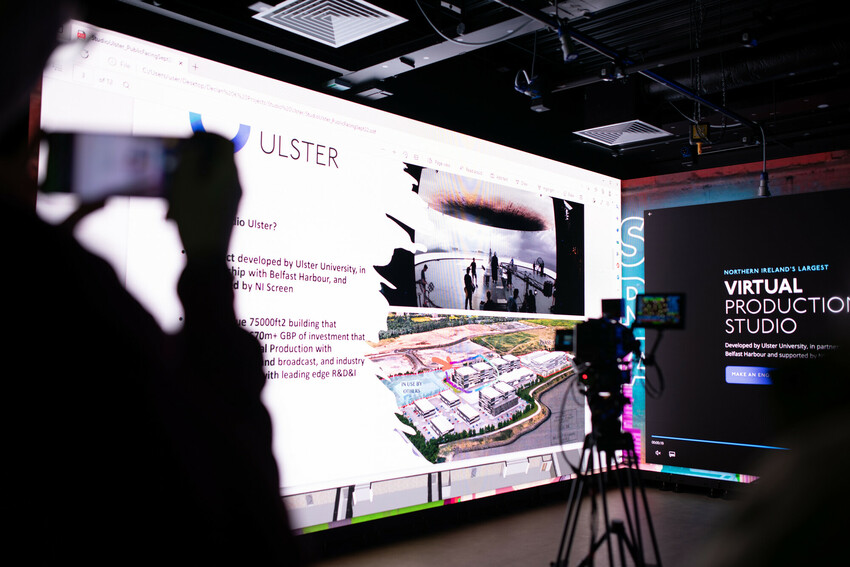New ‘movie magic’ lab in Belfast to keep UK on the cutting edge of future visual effects technologies

Date Posted: June 14, 2023
A new research and development facility in Belfast is set to help drive the next generation of visual effects technologies that will revolutionise the UK’s film, TV and performing arts industries.
The state-of-the-art lab is part of the Creative Industries Sector Vision, published today, which sets out the government’s ambitions to maximise the potential of the UK’s creative industries so they generate an extra £50 billion for the economy and support a million more jobs by 2030.
A consortium led by Ulster University has been selected by the UK Government as a preferred bidder to host one of four new labs specialising in the future of virtual production – a new range of real-time content production techniques using computer-generated imagery (CGI), augmented reality and motion capture to create virtual sets, virtual worlds, and other experiences.
Instead of adding visual effects and CGI in post-production, virtual production allows filmmakers and theatre directors to create large-scale digitally-generated environments that performers can interact with in real-time using LED panels, as a faster and less expensive alternative to green screens.
The technology has been used to great success in the ABBA Voyage live concert at the Queen Elizabeth Olympic Park in London and on Disney’s hit show The Mandalorian. The research facilities will study how the latest developments can be used to ensure the UK has the skills and infrastructure to stay on the cutting edge of this type of technology.
Located at Studio Ulster, a large-scale virtual production campus in Belfast Harbour’s North Foreshore Studios, the facility will bring together expertise from Northern Ireland Screen, BBC Northern Ireland, Belfast Harbour and specialist animation studio Humain.
The lab is part of UKRI’s Convergent Screen Technologies and performance in Realtime (CoSTAR) programme, supported by £75.6 million of government funding and £63 million of new industry investment, which will form the largest virtual production research and development network in Europe, with four other facilities across the country.
Culture Secretary Lucy Frazer said: “Northern Ireland has a long history in film, TV and the performing arts, home to unforgettable scenery and highly skilled creatives behind popular productions including the Oscar-winning Belfast, Line of Duty and of course Game of Thrones. Now we’re putting Belfast at the forefront of future technology for the next generation of filming and live events. Together with experts across the UK, this new lab will make sure the UK stays ahead of the latest developments transforming our screens and stages.”
The network will include a national lab at Pinewood Studios, and a new Insight and Foresight Unit led by Goldsmiths and the British Film Institute. Three regional hubs, in Dundee, Yorkshire and Belfast, are expected to contribute a combined £33 million to the economy and support 423 jobs. Partners involved across the programme include the National Film and Television School, BT, Vodafone, Screen Yorkshire and Disguise as well as Royal Holloway, York and Abertay universities.
Screen productions in Northern Ireland have directly contributed more than £330 million to the local economy since 2018 and boosted the tourism industry by attracting hundreds of thousands of visitors to the region.
The project announced today will help prepare Northern Ireland’s film and TV industry to thrive in the future.
Professor Declan Keeney, Ulster University, said: “We are thrilled to be joining the CoSTAR Network, for what will be a prestigious group of world-leading research labs in the exciting and transformative field of virtual and real-time production. This is a wonderful endorsement of our research leadership in the sector and our investment in the infrastructure needed to level up the screen industries here in Northern Ireland.
“Our CoSTAR Experience Lab will be located at Studio Ulster, a £75 million, state-of-the-art virtual production facility that is set to become a global hub for the creative industries. Studio Ulster will support the growth of this fast growing sector in Northern Ireland and will now be underpinned by a world-class research facility.
“We are confident that our collaboration with the CoSTAR Network will accelerate the development of new technologies and techniques that will revolutionise the way films, TV, games and animations are made. We are excited to see what the future holds for virtual production, and we are proud to be playing a leading role in its development.”
The network is part of more than £233 million in government spending on the creative industries since 2021, including support for Future Screen NI through the Arts and Humanities Research Council’s Creative Industries Clusters Programme which helps entrepreneurs and businesses innovate with new technologies, secure investment to fulfil their growth ambitions, and access global markets.
The Sector Vision published today builds on this further with £77 million in new government funding, including £50 million to launch another wave of the Creative Industries Clusters Programme in at least six more areas. Alongside this investment, the Sector Vision commits the government to a new creative careers promise – a pledge backed by a comprehensive package of actions to open up more opportunities, particularly for young people, to pursue careers in the creative industries.



